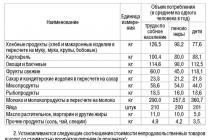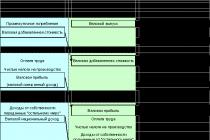Salary indexation is an increase in the salary of all employees of the company. The salary is indexed by an increasing coefficient to the tariff rates (official salaries). Who should index the salary annually, read on
15.03.2016Which companies should index salaries
Indexation is required for all employers, both budgetary organizations and commercial companies (Article 134 of the Labor Code, letter of Rostrud dated April 19, 2010 No. 1073-6-1).
So, budget organizations carry out indexation on the basis of the relevant order of the Government of the Russian Federation. Or the executive body of the Russian Federation.
Commercial firms should develop their own indexing order. This procedure must be fixed in a collective agreement (agreement or local normative act).
On a note! Many heads of commercial organizations believe that only budgetary organizations should necessarily index wages. But it's not. And that's why.
Opinion Constitutional Court . In ruling No. 1707-O dated July 17, 2014, the arbitrators indicated that the employer does not have the right to deprive employees statutory guarantees. Therefore, all commercial companies are required to establish an indexation procedure.
Responsibility for non-indexation of salaries
If indexation is not provided for in the local act and, accordingly, is not carried out, then the company may be fined from 30,000 to 50,000 rubles, and for a repeated violation - from 50,000 to 70,000 rubles. (parts 1 and 4 of article 5.27 of the Code of Administrative Offenses of the Russian Federation).
If the collective or labor contracts contain a condition on indexation. But, in fact, it is not carried out - the employer can be held administratively liable under Article 5.31 of the Code of Administrative Offenses of the Russian Federation. That is, he is threatened with a warning or administrative penalty in the amount of 3000 to 5000 rubles. (Article 55 of the Labor Code of the Russian Federation).
Indexing wages in 2016
Wage indexation in 2016 is an increase in the salary of all employees of the organization. Usually, their tariff rates (official salaries) are increased by a certain coefficient.
When tariff rates (official salaries) are increased by a certain coefficient, the salary in 2016 increases for all employees of the enterprise. But the employer can increase the salary (tariff rate) of individual employees (for various reasons) or employees of some departments selectively by different coefficients.
Where wage indexation is regulated in 2016
Based on the literal interpretation of the concept of "state guarantee", the employer cannot, at its discretion, change or cancel the guarantees declared by the state. It follows that the indexation of wages in 2016 is the responsibility of the company. The specialists of Rostrud agree with this (letter No. 1073-6-1 of 19.04.2010), and the arbitrators of the Constitutional Court of the Russian Federation (Determination of 06.17.2010 No. 913-O-O). However, the difficulty lies in the fact that the legislation does not establish a mechanism for indexing - neither the procedure nor the conditions for its implementation are defined.
Wage indexation is mentioned only in Article 134 of the Labor Code of the Russian Federation. State employees carry it out in the manner prescribed by "labor legislation and other regulatory legal acts containing norms of labor law". Commercial organizations in the manner "established by the collective agreement, agreements, local regulations".
The presence in the collective agreement of a clause on the annual indexation of wages can boast mainly large companies that have acceded to industry agreements in which this obligation is fixed. Such a norm is, for example, in the Federal Industry Agreement on Communications Organizations and information technologies Russian Federation for 2012-2014, approved on December 23, 2011 by the Ministry of Telecom and Mass Communications of Russia No. ISCH-P14-21421.
In small organizations, a collective agreement is not always concluded. And where it is, as a rule, not a word about the indexation of wages. In those rare cases when they do not forget to mention indexation, they make a note: “If the employer has financial opportunities". However, Rostrud specialists insist that if the procedure for indexing wages is not specified in the documents of the organization, then appropriate changes must be made to them (letter of Rostrud dated April 19, 2010 No. 1073-6-1).
How wages are indexed in 2016
Let's figure out who is supposed to index wages in 2016, how often and in what order it should be carried out.
An increase in salaries (tariff rates) leads to an increase in labor costs and a reduction in the tax base for income tax. These facts may be of interest as representatives tax office as well as the owners of the enterprise. In order to avoid problems when preparing indexation documents, reference should be made to the norms of articles and the Labor Code, as well as to stock up on inflation statistics, for example, for the previous year, price increases in the region, changes in cost consumer basket etc.
No matter how developed the country's economy is, the trend of depreciation of money still exists, depending, to a greater extent, on the level of inflation. Today, many citizens of Russia, especially workers public sector, interested in information about the indexation of wages in 2016.
Wage indexation, which means the law
The existing wage indexation system was created to maintain a balance between the income of the population of the country and its purchasing power. What does indexing mean? This is a salary increase to which a multiplying factor is applied, associated with several factors at once. So, for example, writes Wikipedia.
And although there have been talks about raising salaries for a long time, until recently it was not known for sure whether they would be indexed during the year. The situation changed quite recently, when Prime Minister Medvedev spoke about a bill, according to which it is planned to index wages as early as July. Yes, by at least, state the latest news.
Article 134 of the Labor Code of the Russian Federation indexation of wages
The need to index wages in connection with a significant increase in consumer prices for goods and all kinds of services is also indicated by the Labor Code of the Russian Federation. Moreover, the decision on this issue lies not only on government bodies but also to regional governments. It must be carried out in the manner prescribed by Russian labor legislation, as well as various regulations.
Wage indexation coefficient for 2016
As stated earlier, the indexation coefficient will be approximately at the level of the planned inflation, the value of which should be approximately equal to 6%. But, unfortunately, numerous experts believe that its real percentage could reach a significant 15% - 17%, leading to a serious reduction in the wages of the population, unless, of course, their salaries are indexed by Gazprom or some other Moscow companies. The calculation procedure for the workers of these organizations is simple and it is charged with some changes by agreement in advance.
Now, apparently, the situation is changing radically, and the reason for this is Medvedev's speech at the congress of the United Russia party in St. Petersburg. According to him, January, in which the minimum wage increased by only 4%, cannot be considered an adequate indicator of the whole year, since from July 1, the minimum wage will be increased by 21%, which will include wage indexation. This, of course, does not fit in with the resolution of the Cabinet of Ministers on reducing the size living wage for 200 with a little rubles.
How to calculate the position of state employees
Rosstat monthly on its website reports on the level of inflation in the country, and it is on these values that the calculation of indexing the wages of employees of a particular organization depends. To do this, there is a special table that allows you to determine the amount of inflation in any period. In fact, it is the consumer price index. And having already studied the official data and tables of Rosstat, the employer calculates the salary by multiplying it by these indices.
Real example. The salary of an employee for October, November and December of last year amounted to 25,000 rubles per person. Inflation for this period was 4%, so his salary is calculated as follows:
25000 x 104 = 26000 rubles
This is a standard sample calculation, so it is not difficult to calculate this value.
If we talk about state employees, then it should be said that in most areas, indexation of salaries for them in order to save money will not be carried out. The country's government plans to increase payments only to employees of the Ministry of Internal Affairs, as well as civil servants representing other law enforcement agencies.
Salary indexation calculator in Ukraine 2016
Given the seriousness economic situation countries, the government of Ukraine initially did not plan to carry out indexation, deciding to focus only on increasing the salaries of military personnel, police officers and officials. But the possibility of leaving the post of prime minister and the entire Cabinet of Ministers led to the need to increase both pensions and salaries to the population. Albeit not by much, but a shift has nevertheless been outlined, which means that annual, at least minimal indexation will again become the norm. After all, if the level of average monthly inflation is expected to be 12%, then this means that wages should be indexed at the same level.
Now, some requirements have been introduced here, which are the responsibility of the employer, who is obliged to correctly calculate interest. So, in case of refusal to index the payments due to employees, he will have to do this either at the request of the tax authorities or by a court decision, meaning that he will not be able to escape responsibility. Of course, this situation does not apply to the DPR and other unrecognized republics.
In Belarus
Experts will tell you how to correctly index wages in budget and commercial organizations what features should be taken into account by managers.
In the article:
A selection of documents that need to be prepared for indexing:
When is the salary indexation in 2019
From January 1, 2018, wage indexation for budget organizations federal level amounted to 4% (Government Decree No. 1456 dated December 2, 2017, Government Order No. 2716-r dated December 6, 2017).
A 4% increase in salaries occurred not only for all state employees, but also for civil servants. This percentage premium is tied to the inflation index.
Business entities in the non-budgetary sphere have a number of questions regarding indexation. This is due to the fact that article 134 of the Labor Code of the Russian Federation provides extensive information and states that general order indexation and increase in wages of employees in non-budgetary companies are established by labor, collective agreements or local regulations. With this in mind, many employers, personnel officers and accountants believe that wage increases are a right, but not an obligation of the employer. This is not true.
In the rulings of the courts, in the letters of Rostrud of April 19, 2010 under No. 1073-6-1 and of December 26, 2017 under No. 14-3 / V-1135, in a number of other informative acts, it is explained that the employee is entitled to a real increase in wages. At the same time, it should be noted that the employer determines the procedure for indexing wages independently, setting the volume, method and frequency of wage increases. In the absence of indexation, employees have the right to file a complaint with the labor inspectorate.
Useful table from the "Personnel System". Indexation Ratios for Child Benefits
It must be taken into account that if the organization does not have a local act or a separate condition on indexing, then during the inspection the inspector will definitely pay attention to this fact and force it to be corrected immediately. Each employer should provide for an appropriate indexation procedure, since he himself determines the criteria for wage increases. The main thing is to correctly set the size of the additive and the frequency, while formulating everything should be as specific as possible, without using vague phrases.
Wage indexation: determining the frequency
The Labor Code does not specify the specific terms of indexation and the increase factor. But at the same time, the need to index the wages of employees is directly related to the growth in consumer prices for household goods, food products and services.
Wage indexation in 2019, as in all other years, should be carried out by both budgetary and commercial organizations (Article 134 of the Labor Code of the Russian Federation). The procedure for indexing wages to state employees is established by labor legislation and other regulatory legal acts. All commercial organizations have the right to independently resolve issues of wage increases at the local level.
The frequency of the increase directly depends not only on the conscientiousness of the employer, but also on the financial capabilities of the company. By general rule indexation is carried out annually.
Not every company has a collective agreement. Even if it is concluded, indexation is not always indicated in the obligations of the employer. It is important to note that the wording "if the organization has financial capabilities" always causes a number of claims from regulatory authorities, since indexation is an employer's responsibility, and not a right.
Sample collective agreement

To correct the situation, it is possible to make appropriate changes to the collective agreement, agreements, local regulations, including in the case when the procedure for indexing wages was not prescribed in the documents. In one of these documents, a separate chapter is provided, which describes the procedure for indexing. The second way to remedy the situation is to draw up a separate local indexation act. FROM established order salary increases for all employees of the organization are introduced against receipt.
Indexation of wages for state employees in 2019
Indexation of wages in 2019 for state employees is planned.
From October 1, 2019, the salaries of federal state employees are planned to be indexed by 4.3%. Government agencies and GRBS were instructed to take appropriate measures. The basis is the order of the Government of March 13, 2019 No. 415-r.
More than two million state employees and civil servants will fall under the indexation of salaries in 2019. Past indexing only affected certain categories state employees.
 |
Journal "Personnel Business", No. 4, April 2019 Wage indexation: new positions of the Ministry of Labor and the Supreme Court The law obliges the employer to index wages, but does not specify how commercial companies should do this. For budgetary organizations, indexation criteria are determined by regulatory ... |
The procedure for indexing wages
The salary indexation coefficient for 2019 for state employees and civil servants is determined by the Government of Russia. At the same time, in commercial organizations, the employer has the right to independently choose the amount of indexation. The most common way is to increase tariff rates or salaries by a certain factor.
Attention! The specific amount of salary increase is determined by static data on inflation, by price increases in a particular region, by changes in the total cost of the consumer basket.
If the organization is subject to industry agreements, the determination of the increase index must take into account the provisions of the specific industry agreement. With this option, there is no need to determine the indexing coefficient yourself.
If no agreements apply to the organization, the indexation coefficient may correspond to the following indicators:
- the officially established consumer price index for the country or region based on the results of the corresponding period;
- the total amount of inflation fixed in the annual federal law on federal budget or the budget of the constituent entities of Russia, on the territory of which the organization operates;
- a general increase in the subsistence minimum for the working-age population, and so on.
For annual indexation of wages, it is rational to use the annual inflation rate, and for quarterly wages, take into account the cost of living. When calculating the indexation coefficient, reference indicators do not apply to the mandatory value. If the order was not determined by the labor, collective agreement, you can choose an arbitrary indexation value. Thus, if the inflation rate is projected to be 5 percent, it is acceptable to raise wages by 3, 5, or 6 percent. The employer has the right to choose any other indicators.
Wage indexation: indexation order
In accordance with the terms of the collective agreement or local act, the employer makes a decision on indexation and draws up it.
Sample order for salary indexation

Making changes to staffing
Based on the issued order, changes are made to the staffing table. This can be done in two ways. In the first method, a staff is drawn up in new edition and approve by order. This will allow you to visually reflect all changes in the table. The second way is to issue an order to amend the current staffing table. After preparing the administrative document in the "Note" section, indicate the number and date of the order to make changes.
Additional agreement to the employment contract
Contract with the employee supplementary agreement to the main contract. When indexing, the terms of remuneration are changed, which are considered mandatory conditions of the TD (employment contract). The supplementary agreement shall include which clauses of the TD have been changed. standard form such a document has not been developed and approved, therefore, an additional agreement is drawn up in an arbitrary form.
Additional agreement on salary indexation

Responsibility of the employer for evading wage indexation
For non-compliance with all requirements of labor legislation, including the mandatory indexation of employees' salaries, employers and officials of the organization bear administrative responsibility.
It is possible to recognize the employer as guilty of evading wage indexation, given two factors affecting the amount of the fine:
- The provisions for indexation are specified in the collective agreement and in any other local regulatory act of the organization.
- The employer regularly reviews the size of the salary of employees with an increase in consumer prices.
If the provision on indexation is not established in the collective agreement and in the local regulatory legal acts of the organization, then the company faces a fine (part 1 of article 5.27 of the Code of Administrative Offenses of the Russian Federation):
- for officials - from 1000 to 5000 rubles;
- for organizations - from 30,000 to 50,000 rubles.
If the employer has established an indexation procedure, but the wages of employees have not been revised, during the inspection check, he will receive an order to pay employees in full not only the amount that must be paid as a result of indexation. He will also have to pay interest in the amount of 1/150 of the refinancing rate of the Central Bank of the Russian Federation for each overdue day (Article 236 of the Labor Code of the Russian Federation).
Those employers who independently set the indexation of wages lower than that established by the industry agreement will also be fined, provided that it applies to the organization.
Employers are required to index the wages of their employees as consumer prices for household goods, food and services are rising. Indexation affects all employees without exception.
At the same time, the employer determines the coefficient of increase in organizations of the commercial sector independently. An employer can be held liable if he has not determined the indexation order, does not follow it, or does it on an irregular basis
One of the state guarantees to maintain the level of well-being of the population in connection with rising prices is the indexation of wages: in 2016 it underwent significant changes. Today, the procedure for carrying out the procedure in the commercial sphere depends entirely on the conscientiousness of the employer, which causes contradictions in practical application legislative norms. How should staff salaries be increased? How often and who is supposed to hold this event? What documents should be used to document arising expenses in order to avoid claims from tax authorities? Read detailed explanations below.
The economic significance of the procedure is to ensure the purchasing power of employees' income at the current level of inflation by increasing the nominal amount of earnings. This allows us to maintain the existing standard of living and quickly respond to the fall in consumer demand of citizens. There are 2 methods:
- Retrospective - based on prices for the past period.
- Expected - based on forecast prices for the future period.
Normatively, the obligation to index the earnings of employees has long been regulated by the Labor Code of the Russian Federation, namely stat. 130, 134. For municipal and state enterprises the procedure is carried out in accordance with the law, and as for commercial enterprises, everything is at the mercy of business owners. In practice, many managers do not even know that there is such a preventive guarantee for their employees and do not fix the need for salary indexation in internal local acts. Or they include in the collective agreements the unfair wording “if the employer has the appropriate financial capabilities”.
Who is required to index?
By whom it is carried out - all employers who employ employees under employment contracts are obliged to ensure timely indexing of the earnings of their staff. The exception is specialists employed on the basis of the GPA (contracts of a civil law nature). Cancel or modify state guarantees business owners are not eligible. Similar clarifications from Rostrud are contained in Letter No. 1073-6-1 dated April 19. 2010 This statement is also shared by the Constitutional Court of the Russian Federation - Resolution No. 913-О-О dated June 17. 2010 Form of organizational ownership, industry economic activity and the legal status of the company does not matter.
Who is entitled to - all persons working on the basis of employment contracts can count on indexation. The head of the enterprise has the right to apply different coefficients of increase on approved grounds. The exact procedure for conducting for state employees is established by labor legislation, as well as other regulations; extra-budgetary companies determine the mechanism for conducting independently in the LNA, the Regulation on remuneration, collective agreements, industry agreements. This is confirmed by the Constitutional Court of the Russian Federation in the Definitions No. 2618-O of November 19. 2015; 1707-O of 17 Jul. 2014
Periodicity of the event - the frequency is established in collective agreements or internal documents. At the same time, you need to focus on the threshold value of the consumer index market prices at 101%. And the directly increasing coefficient begins to be applied from next month after the period of official publication of statistical data. For example, if the State Statistics Committee in June (before June 10) published a change in the index value for May, the company is obliged to index earnings starting from July.
Note! Indexation should not be confused with an annual increase in workers' earnings. The first case is the obligation of the employer, the second is a voluntary measure that does not exclude the need to fulfill the first.
Penalties for non-compliance:
Many employers do not fix the need for the indexation procedure in their workflow and think that this relieves them of responsibility. But when checking the labor inspectorate, this fact is revealed, an order is issued to eliminate the gaps, and for non-compliance with the law, the organization can be held administratively liable with the imposition of penalties on managers and entity(Art. 5.27 of the Code of Administrative Offenses, in case of repeated violation - article 5.27 of the Administrative Code). If the LNA of the enterprise indexation is provided for, but not performed, as a rule, this leads to the execution of a violation protocol.
The procedure for indexing salaries in 2016
AT current year, as before, the procedure for budget institutions held in legislative order; for all other organizations, it is regulated by internal regulations. Commercial enterprises do not always fix the required clause in collective or individual labor contracts. And if available, they often refer to the disaster financial position, crisis, falling profitability and profitability, which does not allow in practice to implement the procedure.
What information is required to be fixed in the LNA:
- Payments subject to indexation are salaries and their parts, tariff rates, additional payments, compensations, etc.
- Payments not subject to indexation - bonuses, social benefits, fixed surcharges, material aid etc.
- Timing of the procedure and frequency - indexation date or period (year, quarter, month or half a year).
- The procedure for determining the increasing coefficient is according to the consumer price index (regional or countrywide), the inflation rate of a territorial region or federal, and an increase in the official subsistence minimum.
- Formulas for calculating indexed earnings.
- The indexation coefficient is set in a separate order of the enterprise.
- Sources of payments for indexation.
Each indexation should be accompanied by the issuance of an appropriate order approving the specific dates for the start of the event and the value of the coefficient. The document, signed by the head of the company, is the basis for the accrual and payment of remuneration to employees in an increased amount. In addition, this is the justification of expenses in terms of taxes paid by the enterprise in accordance with the applicable tax regime.
Note! Although indexation does not equate to a general increase in wages for the enterprise, it is one of the mandatory conditions labor contract. The implementation of the procedure entails the need to change the contractual clauses for each employee whose earnings have been indexed. To not make out every time a large number of documents, it is recommended to initially register in employment contract that the salary of a specialist is calculated taking into account indexing, and indexation is carried out according to a specific LNA.
Indexing News 2016
Currently in State Duma An important Draft Law (No. 1055983-6) on amendments to the Labor Code of the Russian Federation is under consideration. According to this act, it is planned to establish a mandatory minimum indexation for all employers, except for the monthly earnings of employees (subject to fully worked out working hours) in the amount of 10 times the accepted subsistence minimum in Russia for the category of able-bodied citizens. At the same time, it is planned to establish the frequency of the procedure - at least once a year, and the value of the coefficient - not less than the minimum of the federal consumer price index.
As explains explanatory note to the project, at present the obligation of enterprises to index earnings due to the growth in consumer pricing is interpreted as a voluntary opportunity, but not an obligation. Even if there is such a clause in local acts, employers do not increase wages and do not take into account the decrease in the real level of income of their staff. Introduction federal law(planned from January 1, 2017) will not allow organizations to evade the performance of regulated duties, which will protect the income of the population from inflation.
If you find an error, please highlight a piece of text and click Ctrl+Enter.














